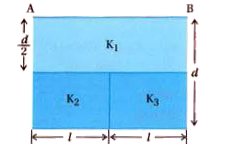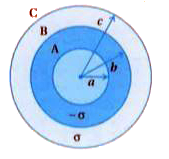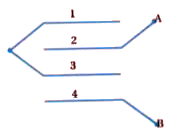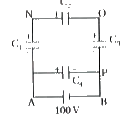Complete Solutions to Section B ( Numerical From DARPAN. Based on Textbook ) of chapter ELECTROSTATIC POTENTIAL AND CAPACITANCE of Class 12 book with complete answers and questions
| Class 12 | PHYSICS |
| Chapter | ELECTROSTATIC POTENTIAL AND CAPACITANCE |
| KUMAR PRAKASHAN | Section B ( Numerical From DARPAN. Based on Textbook ) |
| Number Of Questions | 19 |
| Academic Year | 2023-24 |
An electric field is represented by `vecE = "Ax" hati` where A = `10 (V)/(m^(2))` . Find the potential of the origin with respect to the point (10,20) m.
View SolutionCharge Q is distributed uniformly over a non conducting sphere of radius R. Find the electric p-0tential at distance r from the centre of the sphere r `(r lt R)`. The electric field at a distance r from the centre of the sphere is given as `(1)/(4pi epsilon_(0)). (Q)/(R^(3))hatr` . Also find the potential at the centre of the sphere .
View SolutionProve that the force acting on one plate due to the other in a parallel plate capacitor is ` F =(1)/(2) (CV^(2))/(d)` .
View SolutionFind the capacitance of the capacitor shown in the figure. Area of AB is A. `K_(1), K_(2), K_(3)` are dielectric constants of respective materials

View SolutionA substance has a dielectric constant 2.0 and its dielectric strength is `20 xx 10^(6)` V/m . It is taken as a dielectric material in a parallel plate capacitor. The minimum area of its each plate such that its capacitance becomes `8.85xx10^(-2) muF ` and it can withstand a potential difference of 2000 V is ......
View Solutionln a certain region, the electric potential is given by the formula V (x, y, z) = `2x^(2)y + 3y^(3)z - 4z^(4)x`. Find the components of electric field and the vector electric field at point (1, 1, 1) in this field.
View SolutionA spherical drop of water bas `3 xx 10^(10)` C amount of charge residing on it. 500 V electric potential exists on its surface. Calculate the radius of this drop. If eight such drops (having identical charge and radii) combine to form a single drop, calculate the electric potential on the surface of the new drop. `(k = 9 xx 10^(9)` SI)
View SolutionConsider A, D and C to be the co-centric shells of metal . Their radii are a ,b and c respectively (a < b < c). Their surface charge densities are `sigma, -sigma` and `sigma` respectively. Calculate the electric potential on the surface of shell A.

View SolutionThe area of each plate shown In the figure is A and the distance between consecutive plates is d. What is the equivalent capacitance between points A and B ?

View SolutionA point P, is 40 m away from charge 2 `mu` C and 20 m away from charge 4 `mu`C. Find the electric potential at point P. How much work to be done for a charge ot - 0.4 C brought from infinity to point P ?
View SolutionTwo charges 2 C and 3 C are located 100 m apart. At what point on the line joining the two charges is the electric potential zero ? Take the potential at infinity to be zero. .
View SolutionThree point charges 1 C, 2 C and 3 C are placed at the corners of a equilateral triangle. The length of triangle is 1 m. What would be the work required to put these charge on the corner of an equilateral triangle of length 0.5 m ?

View SolutionDetermine the electrostatic potential energy of a system consisting of two charges 6 `mu`C and - 3 `mu`C (and with no external field) placed at (-9 cm, 0, 0) and (9 cm, 0, 0) respectively.
View SolutionHow much work is required separate the two charges infinitely away from each other ?
View SolutionSuppose that the same system of charge is now placed in an external electric field E = A(l/`r^(2)), A= 9 xx 10^(5) cm^(-2)`. What would the electrostatic energy of the configuration be ?
View SolutionA molecule of a substance has a permanent electric dipole moment of magnitude `10^(-30)` Cm. A mole of this substance is polarised (at low temperature) by applying a strong electrostatic field of magnitude `10^(7) vm^(-1)`. The direction of the field is suddenly changed by an angle of `60^(@)`. Estimate the heat released by the substance in aligning its dipole along the new direction of the field. For simplicity assume 100 % polarisation of the sample. 1 mole `= 6 xx 10^(23)` molecule.
View SolutionDetermine the equivalent capacitance of the network and the charge on each capacitor. Each capacitor having capacitance of 12 `mu F `.

View SolutionDetermine the equivalent capacitance of the network and the charge on each capacitor. Each capacitor having capacitance of 6 `mu F `.

View SolutionA 900 pF capacitor is charged by 50 V battery. Find the electrostatic potential energy of this capacitor. (2) Now this capacitor is disconnected from the battery and connect to another equivalent capacitor, then what is the total electrostatic energy stored by the system respectively ?
View Solution
Section B ( Numerical From DARPAN. Based on Textbook ) questions and complete solutions for chapter ELECTROSTATIC POTENTIAL AND CAPACITANCE of KUMAR PRAKASHAN KENDRA PHYSICS (GUJRATI ENGLISH) of Class 12
All Exercises from KUMAR PRAKASHAN Class 12 PHYSICS ELECTROSTATIC POTENTIAL AND CAPACITANCE
- ( Section -A) Try Yourself
- ( Section -A) Questions - Answers
- Section B (questions)
- Section B ( Numerical From DARPAN. Based on Textbook )
- Section B ( Numerical From Textual Exercise )
- Section B Numericals
- Section C ( NCERT Exemplar Solution ) ( Long Answer Type Questions )
- Section C ( NCERT Exemplar Solution ) ( Multiple Choice Questions (MCQs ) )
- Section C ( NCERT Exemplar Solution ) ( Very Short ,Aswer Type Questions )
- Section C ( NCERT Exemplar Solution ) (Short ,Aswer Type Questions )
- Section D ( MCQs asked in Cometitive Exams )
- Section D ( Multiple Choice Questions (MCQs) )